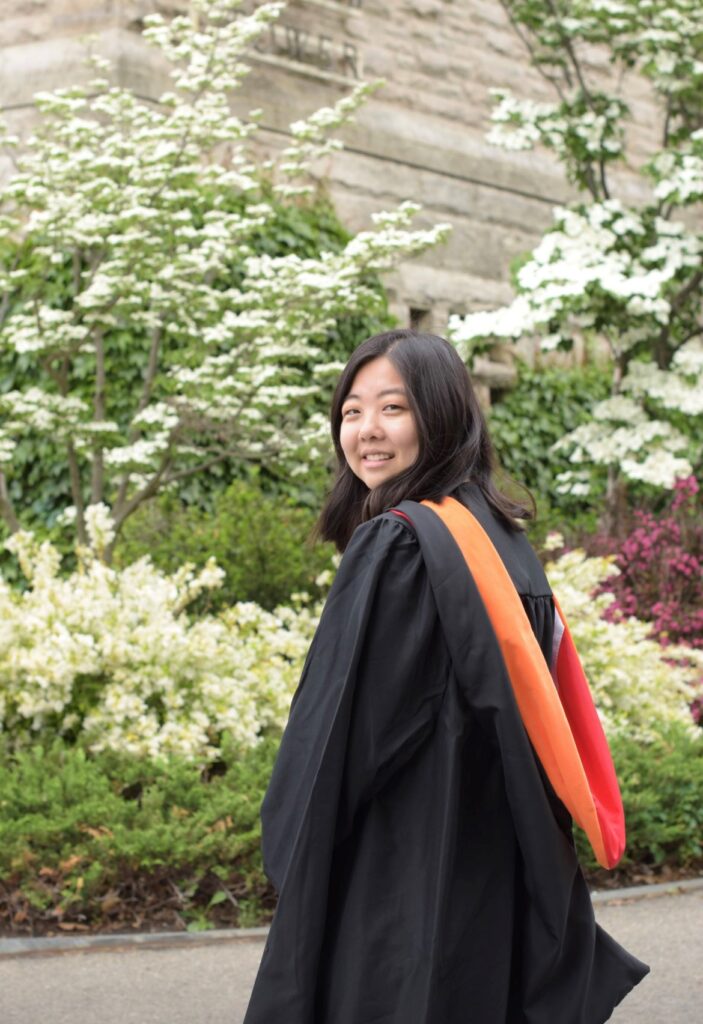Since 2018, Emergent has awarded scholarships to the children of Emergent employees who plan to pursue a post-secondary education through our Emergent Scholars program. Emergent Scholars is one of the ways we demonstrate our commitment to educate tomorrow’s scientific leaders, support efforts to build a STEM-capable workforce, and continually invest in our employees and their families.
To celebrate the five-year anniversary of the Emergent Scholars program, we’re checking in with past scholarship recipients to see where they are today and highlight the great work they are doing.
Today we’re speaking with Lucy Du, a double Cornellian, who received a bachelor’s degree in statistics and economics in 2020, followed by a master’s degree in applied statistics in 2021 from Cornell University. Now, Lucy works full-time as a credit risk analyst, and is interested in using her skills and experience in the data field to make an impact.
Read more about the impressive work Lucy completed while at Cornell, and now in her career, and how receiving a scholarship through the Emergent Scholars program has impacted her.

Name: Lucy Du
School: Cornell University
Area of study: Statistics and Economics
Graduating class: 2020
Hometown: Baltimore County, MD
Tell us about yourself, and what you’re currently up to.
Hi, I’m Lucy Du. Originally from Baltimore County, I went to Cornell University to get a bachelor’s degree in Statistics and Economics. After graduating a semester early, I completed a master’s degree program in Applied Statistics.
Currently, I’m working as a credit risk analyst, mainly looking at what we can learn from credit card data to manage the company’s portfolio.
What inspired you to pursue a degree in statistics and economics?
I wanted to learn more about statistics because I think data is super interesting! Debugging can get frustrating at times but being able to manipulate data and draw conclusions from it is very satisfying. I also pursued economics because it provides a broad understanding of a range of topics like business, government, politics and more.
What are some of your favorite courses you took, and how have they impacted what you are currently doing in your career, or what you want to do in the future?
A lot of the classes I took focused on statistics and data analysis, centered around key topics like research design, databases and big data, and data science. For my economics degree, I really enjoyed classes that touched on tangential areas like psychology, history, or sociology; some of the ones I liked included behavioral economics and environmental economics. Particularly through my statistics studies, I was able to gain skills centered around data cleaning, processing, and manipulation that go hand in hand with my work now. The classes I took alongside them taught me to see the world in a different, more meaningful way.
Outside of your coursework, what are some of the things you were involved with on campus?
With my economics background, I joined a pro-bono consultancy organization on campus centered around social impact businesses and social enterprise. It was one of the most meaningful experiences I was able to take part in, both personally and professionally, because of the opportunity to not only apply my economics knowledge, but also contribute in a positive way. I also held an on-campus job at the Center for Teaching Innovation where I helped with data analysis on a variety of projects related to pedagogy, and was involved in a service organization where I volunteered on- and off-campus.
What do you ultimately want to do for a career, and why did you choose that profession?
I’m not sure where I’ll be in the next 5, 10, 20 years, but I’d like to continue to hold a data-centric job and work to make social impact.
How has receiving a scholarship from the Emergent Scholars program impacted you, and your studies?
As a two-time recipient, the Emergent Scholars program considerably helped me complete my undergraduate degree, and also helped me afford to pursue my graduate studies. I’m a huge proponent of lifelong learning and the growth mindset, and I was elated when I received it. I’m eternally grateful for the opportunities I could take on academically, which have set me onto the path I’m on now.
What advice do you have for high school students considering your area of study?
My advice would be to try to learn a data analysis/programming language early. It definitely helps to have a foundation! Otherwise, I think maintaining a good balance between qualitative and quantitative subjects that you study will help to make you a well-rounded individual, and to not lose yourself in all those numbers.

Congratulations on all your accomplishments, Lucy! We look forward to hearing about your continued success, and how you leverage your statistics and economics skills to make a difference.